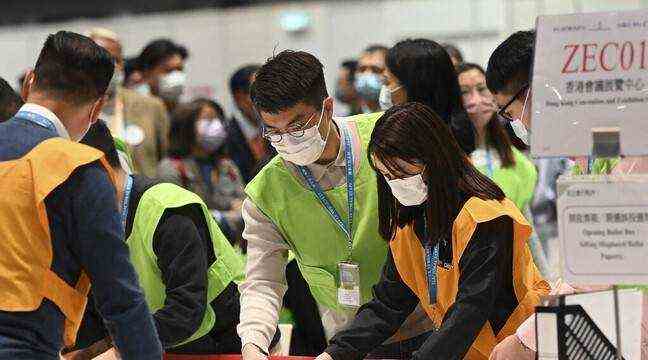In accordance with the new rules imposed by Beijing, the Hong Kong people began to vote this Sunday to appoint their representatives to the Legislative Council of the city, but only the “patriots” can run, considerably reducing the number of seats elected directly by the population. .
Each of the 153 candidates had to give pledges of political loyalty to China and “patriotism” to be allowed to run for office. As a result, pro-democracy activists have been barred from standing or renounced when they are not in prison or on the run abroad, and most candidates display a similar profile.
Free transport
Of the 90 seats in the Legislative Council (the “LegCo”), only 20 are open to universal suffrage, half as many as before, the rest being appointed by various committees and interest groups vested in the Chinese regime. The only real unknown in the ballot will therefore be the turnout, a thermometer of the adherence of Hong Kongers to the new electoral system. The new rules were imposed by Beijing as part of the takeover of Hong Kong after the gigantic pro-democracy protests of 2019. All Hong Kongers of voting age, or about 4.5 million people out of a total population of 7.5 million, can participate in the ballot.
Daniel So, 65, was among the first to line up outside a polling station in the affluent Mid-Levels district. “Young people are not so interested in this election because they are misled by politicians and foreign media,” he regrets. When the chief executive Carrie Lam arrived to vote, three demonstrators of the League of Social Democrats, pro-democracy, chanted: “I want real universal suffrage”.
Carrie Lam “said it was an improvement in the electoral system, but in reality it deprived Hong Kongers of their right to vote,” said activist Chan Po-ying. Carrie Lam and her ministers have stepped up calls to go to the polls. The government published advertising pages in newspapers, distributed leaflets in mailboxes and sent massive text messages reminding Hong Kong people to vote. Public transport is free during election day.
“My vote would be useless”
Despite these efforts, the latest polls predicted participation in the order of 48%, which would be a historically low figure. At midday, 839,563 voters had slipped a ballot in the ballot box, a participation rate of 19%, according to the authorities, the lowest rate at mid-term since the return of the territory to China in 1997.
Ahead of the poll, Carrie Lam said a low turnout “wouldn’t mean anything.” “When the government does things right and its credibility is strong, voter turnout is lower because people don’t really feel the need to choose new representatives,” she told Chinese state media. last week. Recent independent polls put Carrie Lam’s popularity rating at around 36%.
“My vote would be useless, because at the end of the day it is the people of Beijing who win,” said a young accountant in her twenties who calls herself Loy and does not have the intention to vote. The “LegCo” is the body responsible for passing laws in the former British colony, whose legal system remains distinct from that of mainland China. Even if the established figures in Beijing have always been granted the majority of seats on the Council, a minority of opponents was once tolerated there, which made it a place of often very heated debate. The new rules imposed by Beijing put an end to this tradition.
“Anti-Chinese” elements
More than a dozen elected officials in the previous ballot in 2016 are currently in prison under a draconian “national security” law imposed by Beijing last year, and three have fled abroad. Beijing says this “improved” electoral system will eradicate “anti-Chinese” elements, and ensure that the “LegCo”, where debates could once be long and heated, will adopt the new laws more quickly. Open at 8:30 a.m. (1:30 a.m. GMT), the ballot will close at 10:30 p.m. (2:30 p.m. GMT).
It is legal in Hong Kong to abstain or to vote blank or null. On the other hand, encouraging these practices has been a criminal offense since this year. Ten people have been arrested under the new law, mainly for boycott calls launched on social networks, and arrest warrants have been issued against pro-democracy activists who have taken refuge abroad who have also called to sulk the urns. Police deployed more than 10,000 officers to the streets of Hong Kong on Sunday to prevent any incidents.

